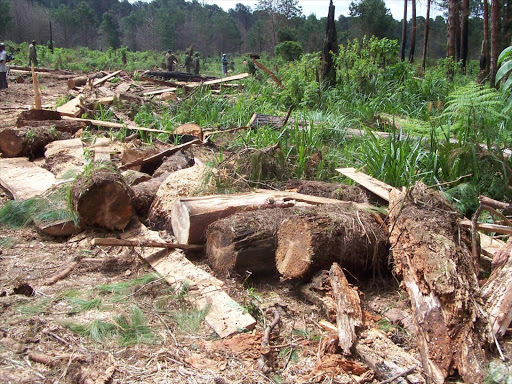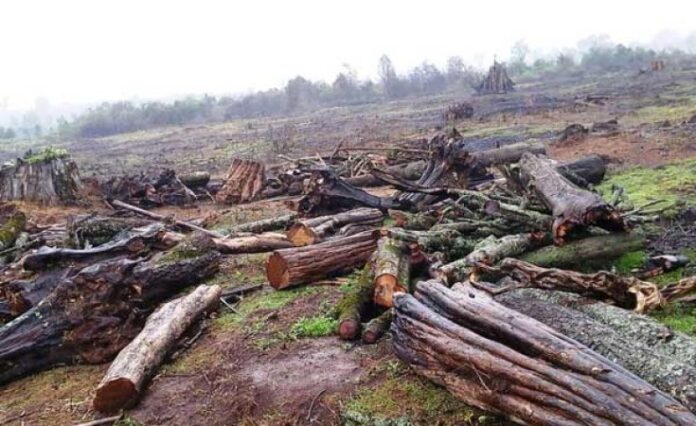By Henry Owino
Nairobi, Kenya: Environmentalists have expressed their concerns after Kenya’s President William Ruto announced the reinstatement of the ban on illegal logging. The ban has been in existence for the past six years.
Many like-minded organizations championing environmental conservation have termed the move as a serious threat to water towers and other catchment areas.
One such organization that was quick to react to Ruto’s statement is Greenpeace Africa which is alarmed by such developments. During last year’s Mashujaa Day celebrations, President Ruto made a commitment to increase the forest cover to 30% by 2032.
Greenpeace Africa is seriously perturbed that barely 8 months down the line the president has made a u-turn on his own words. This really sends a warning to Kenyans that many promises made by the president during his political campaigns hang in the balance.

Tracy Makheti, Greenpeace Africa, Community Manager said it was unbelievable to hear the live stream news from Molo in Nakuru County hearing the president declaring a lift on the six-year-old ban on logging.
“Greenpeace Africa is alarmed by these developments. During last year’s Mashujaa Day celebrations, President Ruto made a commitment to increase the forest cover to 30% by 2032. Greenpeace Africa is perturbed that 8 months down the line the president has made a u-turn on his own words,” surprised Makheti emphasized.
The environmental campaigners noted that there is clear evidence of a lack of goodwill in implementing the existing policies on illegal logging. She said by lifting the ban, President Ruto has prioritized profit over people and nature. “The ban on logging in public and community forests should not be based on monetary value, but rather on restoring our natural forests with indigenous trees,” complained.
“Lifting the ban will undo all our hard work, as it will open the floodgates to commercial and illegal logging solely driven by profit. Our forests will be at the mercy of saw millers who have no regard for the consequences.” Makheti, Greenpeace Africa, Community Manager lamented.
Makheti advised that the Ministry of Environment and Forestry should upscale the establishment of mixed forest plantations as it will increase forest cover and at the same time increase revenue while building the economy by providing employment opportunities. The Ministry should also consider planting indigenous trees in the 8,000ha bare buffer zones, to help restore biodiversity and increase forest cover.
As a long-term solution the Ministry, it should work to foster collaborative relations with communities living near the forests as well as environmental protection agencies and activists instead of resorting to unsustainable solutions. Additionally, the Ministry should prioritize fast-growing species of bamboo to supplement the wood and timber needs of the country.
“Greenpeace Africa is petitioning CS Soipan Tuya and President Ruto to immediately reinstate the ban on logging in all the community and gazetted forests and also develop a model where NGOs can adopt these spaces to take care of the indigenous trees.” Makheti asserted.
According to Ruto, the move was “long overdue” and was aimed at creating jobs and opening up sectors of the economy that rely on forest products. He made the announced-on Sunday, 2 July that lifted an almost six-year ban on logging policy despite the concerns of environmental campaigners.
“We can’t have mature trees rotting in forests while locals suffer due to lack of timber. That is foolishness,” Ruto said at a church service in Molo, Nakuru County.
“This is why we have decided to open up the forest and harvest timber so that we can create jobs for our youth and open up business.”
Ruto, who has positioned himself at the forefront of African efforts to combat climate change, said the government would push ahead with its plans to plant 15 billion trees over 10 years. The end of the ban is likely to delight saw millers and timber merchants who protested that it had caused major job losses.
The moratorium was imposed by the previous government led by Uhuru Kenya in February 2018 in public and community forests with the aim of stamping out rampant illegal logging and increasing the nation’s forest cover to 10 percent.
But Greenpeace Africa has warned that the decision would have “catastrophic environmental consequences”.
“In Kenya, forests are home to rare and endangered species, and millions of local people depend on these forests for their livelihoods, relying on them for food and medicine,” Greenpeace Africa said last month in a petition against the move.
“Since the Kenyan government imposed the ban on logging six years ago, significant progress has been made in forest protection and with combatting the climate crisis,” part of the petition read.
Forestry and logging contributed 1.6 percent to Kenya’s economy last year, according to government statistics which also said the total forest cover was 8.8 percent in 2022.














